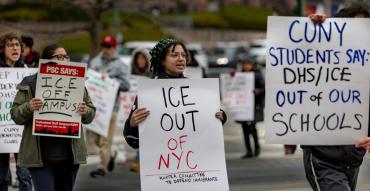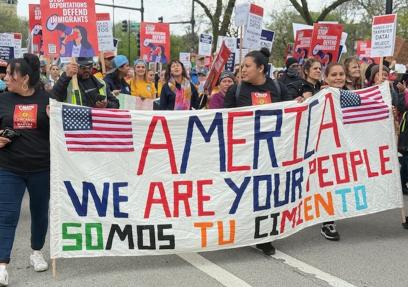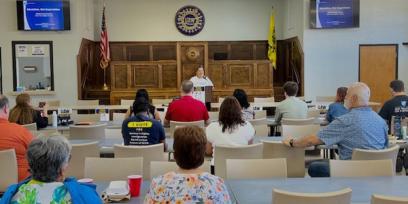As the Trump administration continues to trample the rights of immigrants and visitors to this country—and citizens wonder how long it will be before they are targeted too—AFT members are particularly shaken as students and faculty around them are illegally detained, stripped of their legal status and frightened by the prospect of deportation.
- Mahmoud Khalil was whisked away in an unmarked car by plainclothes officials who did not tell his pregnant wife where they were taking him. The recent Columbia University graduate student wound up in a detention facility 1,400 miles away, in Louisiana, and missed the birth of his child on April 21. He has a green card—meaning he is a legal permanent resident of the United States.
- Tufts University student Rumeysa Ozturk was taken by masked men outside her apartment, where they took her phone, handcuffed her and put her in an unmarked car. She is also in the Louisiana detention facility. She has a green card.
- Homeland Security agents came to the home of 21-year-old Columbia University student Yunseo Chung to arrest and possibly deport her. She was not at the apartment, and though agents looked for her at other locations, including her parents’ home, they did not find her. Chung moved to the United States from Korea at age 7. She has a green card.
Besides these and other arrests, an estimated 1,800 students have had their visas revoked in recent weeks, putting them at risk for deportation. At least one fled to Canada. Some, like the people listed above, have been accused of antisemitism because they participated in Palestinian rights protests—calling into question the reliability of our free speech rights. Others had their visas revoked for no apparent reason. This map from Inside Higher Ed offers an eye-popping visual of the 280 colleges and universities where students have had their visas revoked.
All of them are international students, underscoring the Trump administration’s promise of mass deportations and highlighting its continuing acrimony toward colleges and universities, where these targeted students contribute to a rich culture of intellectual exchange.
All of this occurs in a landscape of repression in higher education. The federal government has withheld $2.2 billion in funding from Harvard, claiming in part that the school has not done enough to address antisemitism; the lost funding would have paid for research on things like cancer and Alzheimer’s disease, which have nothing to do with antisemitism or Palestine. Another $400,000 million was taken from Columbia, and $1 billion is threatened at Cornell. Seven elite universities have been targeted for cuts; another list names 10 institutions being scrutinized for antisemitism and targeted for related retaliation, and 50 universities have been warned they are under investigation.
Some institutions are capitulating by cracking down on protests and changing policies that protect academic freedom and campus free speech.
A chilling effect
Who will be next? International students—and international faculty and staff, who also feel threatened—are afraid to find out, and many are self-censoring. Students are taking down social media posts and avoiding protests of any kind. People who have learned that their legitimate student visas have been revoked are holing up with family or friends, avoiding their own homes and skipping classes for fear of being arrested and deported. Universities are reviewing course descriptions to change any language that might be flagged as antisemitic or indicative of diversity, equity and inclusion content—another principle the Trump administration wants to eliminate.
“When dissident voices on our campuses are suppressed, when protestors are abducted off our very streets into deportation proceedings without due process, that creates fear,” said James Davis, president of the Professional Staff Congress, the AFT affiliate for faculty and staff at the City University of New York, during a rally April 17. “That creates a chilling effect.”
Fighting back
People across the country are standing up against these threats. PSC has co-organized rallies with students, including one called “Rally for the Right to Learn” and another to protest outside a career fair where Homeland Security was recruiting students.
May Day rallies across the country swelled with hundreds of people carrying immigrant rights signs, denouncing deportations and standing up for justice. Know Your Rights sessions—advising students and community members about how to respond should Immigration and Customs Enforcement agents knock on their doors—have proliferated: The AFT has sponsored them from California to Texas, and affiliates have organized them as well, including the Chicago Teachers Union, the Boston Teachers Union and United Teachers Los Angeles. The AFT has also held a webinar to help leaders better understand and respond to immigration enforcement on campus.
Printable resources, like pocket-sized Know Your Rights cards for those panicked moments when ICE comes knocking—to remind people they do not have to open the door to immigration officials—are widely available in multiple languages and have been distributed to and by countless AFT members who want to protect themselves and their communities.
Using the courts
Students whose visas have been revoked have filed more than 100 lawsuits, some of which have been resolved favorably—for now. Yunseo Chung, the Korean student at Columbia, won a restraining order to prevent federal agents from arresting her. The suit also seeks to stop the rash of arrests associated with international students who have protested for Palestinian rights.
The Presidents’ Alliance on Higher Education and Immigration, a coalition of more than 570 college and university leaders, sued the Department of Homeland Security to halt unlawful termination of international students’ visas. “We are going to court to protect the rights of international students and defend our member institutions’ ability to appropriately attract, retain, and support them,” says President’s Alliance President Miriam Feldblum. “The unlawful termination of student records without due process strikes at the heart of higher education’s mission.”
The American Association of University Professors, with its Harvard, Rutgers and New York University chapters and the Middle East Studies Association, filed a suit to block the large-scale detentions focusing on those who have participated in pro-Palestinian protests. “The ideological-deportation policy has created a climate of repression and intense fear on university campuses, terrorizing students and faculty for their exercise of First Amendment rights in the past, intimidating them from exercising those rights now, and silencing political viewpoints that the government disfavors,” AAUP says.
“The Trump administration is going after international scholars and students who speak their minds about Palestine, but make no mistake: they won't stop there,” says AAUP President Todd Wolfson.
“They'll come next for those who teach the history of slavery or who provide gender-affirming health care or who research climate change or who counsel students about their reproductive choices. We all have to draw a line together—as the old labor movement slogan says: an injury to one is an injury to all.”
[Virginia Myers]



